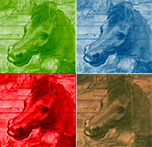
The National Centre for Scientific Research (CNRS) and the French Laboratory of Research on Historical Buildings (LRMH) are organizing the 2st IPERION CH Training Camp, which is to be held at St Ayoul Church in Provins (France) from 19th to 23th March 2018.
The Training Camp will offer the opportunity for a hands‐on training regarding the functioning of the MOLAB platform (The MObileLABoratory) of IPERION CH, which gives access to an impressive collection of advanced mobile analytical instrumentation for non‐invasive measurements on precious, fragile or immovable objects, archaeological sites and historical monuments. The MOLAB allows its users to implement complex multitechnique diagnostic projects, facilitating the most effective in situ investigations. This Training Camp will offer practical training for the MOLAB, and will
show trainees and students how science can contribute to the identification and evaluation of conservation posed by all kind of immovable artefacts (paintings, architectural painted decorations, stones etc…).
The Training Camp will be based on a problem‐solving approach. Three areas of St Ayoul Church have been identified as relevant for the training camp, and for each area, some questions have been raised ;
- The first zone will be used for an exercise in diagnosis regarding the different deterioration patterns resulting from capillary rises of water and subsequent salt efflorescences on the plaster/painting surface. The arising questions are: What is the water content in the wall? Can we localize the defaults? Are they still active? Can we
characterize the salts in non-destructive ways? - The second zone will be used to characterize wall paintings and try to answer questions: What is the composition of the pigments? What is the stratigraphy? Are there hidden figures behind the visible surface?
- The third zone will be situated on an easel painting. The following problems will be treated: What is the stratigraphy? Are the underdrawings present? Where is the signature?
These case studies will be addressed in small (5 people max.) groups and will lead to the use of different combined MOLAB techniques. They will involve direct interactions with the reference expert scientist for each technique, encouraging thorough discussions and constructive debate amongst the participants. After a short theoretical introduction to the different case studies and techniques, the Training Camp will be structured around 5 days of practical analytical sessions, and group discussions about the obtained results and proposed conclusions.
For practical information, programme and registration, travel and accommodation please, check this document.
